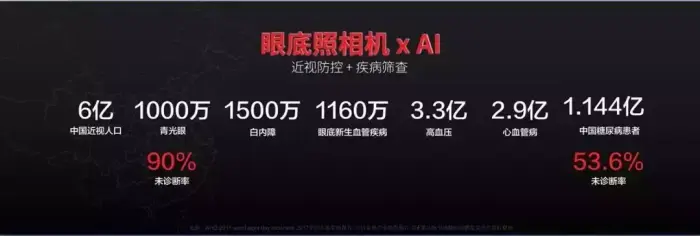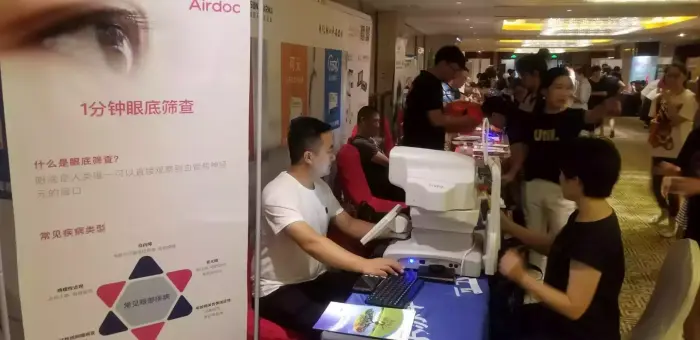
Airdoc, and Wanbang Pharmaceuticals Conduct Screening for Conference Participant
The conference mostly consisted of famous experts from inside and outside the province giving special lectures on endocrinology and diabetes research. In this academic setting, Airdoc and Wanbang Pharmaceuticals used artificial intelligence to provide real-time screening services.
Liaoning’s Present Plight
Liaoning Province is the oldest province in China; 13% of the population is more than 65 years old. Elderly care is putting pressure on society and medical resources are strained.
At present, there are about 140 million Chinese citizens with diabetes, the majority of which are elderly. Not only are the number of diabetics and other chronic illness patients increasing, the number of people with hypertension has jumped to 270 million. Take the case of macular degeneration, which affects a large patient population but has a low detection rate. If left untreated, more than 80% of patients go blind. Although many vascular, neurological, endocrine, and ophthalmic diseases can be detected early using retinal images, medical resource constraints severely limit screening for chronic diseases.

A New Breakthrough
The Liaoning Provincial Government issued the “Liaoning Population Development Plan (2016-2030)” to alleviate the province’s elder care issues. To improve the system, we must speed up the improvement of home-based elder services, with the community and institutions as supplements. We need to guide related industries and enterprises to promote the development and application of elder care technologies and attach great importance to medical artificial intelligence. Artificial intelligence is another way to extend strained resources, and in the medical industry technology and AI are becoming increasingly valued.
In the last few years, medical artificial intelligence companies such as Airdoc have made successful advances in auxiliary medical treatment, healthcare management, and medical imaging. As Airdoc founder Dalei Zhang said, it is possible to detect early-stage diseases and prevent them or treat them accurately. Prevention is important since treatment requires significant resources.
Kai Yu, Airdoc’s Northeastern District Head, was responsible for screening at the venue. Yu stated that the conference was a gathering for everyone to discuss diabetes, and Airdoc and Wangbang Pharmaceuticals were conducting retinal screening to let more people know about Airdoc’s algorithm. With this demonstration, conference-goers can understand medical AI’s uses.

Representatives from Microsoft Accelerator Shanghai and the National Development and Reform Commission went to personally experience Airdoc’s algorithm and expressed their interest. Airdoc’s entry into Guangzhou Yuexiu District’s community was welcomed. As one of the few medical technology companies in the country, our goal is the make Airdoc a health diagnosis tool for everyone.
Preventing Chronic Disease
Currently, the Airdoc algorithm can identify a variety of chronic diseases such as diabetes, hypertension, arteriosclerosis, cataracts, glaucoma, and more. The AI’s experience is equivalent to a senior doctor who has been working in a hospital for 760 years; its diagnoses are 97% accurate.
Existing methods for detecting chronic diseases use blood tests, which are invasive and costly. In general, Chinese people will not go to the hospital for a physical examination unless they have a major illness. As a result, many patients fail to prevent chronic diseases or get early-stage treatment. Now, with the development of medical AI, this situation will be greatly improved.
For example, diabetes has three stages, with the final symptom being blindness. Many celebrities have suffered from diabetes, despite attaching great importance to their health. Due to the lack of effective testing methods, it is difficult to detect or avoid the disease. Now, Airdoc can detect a variety of chronic diseases such as diabetes through retinal screening, with an accuracy of 97%. There is no complicated testing procedure. After following the company’s WeChat service account, the patient will have their screening results directly sent to them through WeChat, protecting their privacy.
As Yu said in his speech at the conference, many elderly people in the Liaoning Province suffer from chronic diseases, and not all elderly can afford medical examination expenses. Many seniors are financially disadvantaged and can only endure the pain and suffering. Airdoc and hospitals can cooperate to fill this gap in medical resources.
The joint efforts of Airdoc and Wanbang Pharmaceuticals at the conference will help us serve Liaoning better and faster. All participating doctors can see that our technology can be important assistants that reduce their diagnosis times and error rates.
Sincere Collaboration
Wanbang Pharmaceuticals’ director said that the company has been working with China’s endocrinology experts for a long time. The company is always looking for more efficient and simple ways to help doctors and patients in China’s endocrinology departments. Airdoc’s artificial intelligence chronic disease identification system is fast, easy, and non-invasive. It can accurately examine diabetic patients for diabetes-related chronic diseases. Wanbang’s director is full of hope regarding Wanbang and Airdoc’s cooperation.
AI technology provides a supplementary diagnosis and treatment tool for endocrinologist and general practitioners, comprehensively improving the level and efficiency of standardized diagnosis and treatment. It is a godsend for Chinese diabetic patients. Both medical departments will use their respective strengths to fully promote the development of medical AI in the Liaoning Province.



